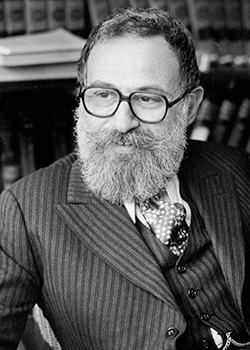On October 3, 2019, Oscar S. Gray, Maryland’s Jacob A. France Professor Emeritus of Torts, passed away at the age of 93. While best known for his torts scholarship, Professor Gray held the distinction of being the author of the nation’s first environmental law casebook, Cases and Materials on Environmental Law. The field of environmental law was in its infancy when Gray’s book was first published in 1970. A second edition was published in 1973.
Prior to joining the Maryland faculty, Gray served as acting director of the Office of Environmental Impact at the U.S. Department of Transportation. Among the speakers at the law school’s memorial service for Professor Gray were Judge Guido Calabresi and Professor Robin West. Professor Robert Percival, director of the Environmental Law Program, reflects on his time with Professor Gray in the tribute below.
Professor Percival's Remembrance of Professor Oscar Gray
Although I do not remember meeting him during the recruitment process, Oscar Gray was the most wonderful surprise I had when I joined the Maryland faculty. We quickly discovered shared passions for wine and baseball and Oscar’s extraordinary kindness instantly made me feel that Maryland was where I truly belonged. His fierce dedication to scholarship was an inspiration to me and to all other young faculty members at a time when the school was making great strides.
Oscar was unduly modest about his enormous accomplishments, though he let on that he was excited that Maryland was establishing an Environmental Law Program. Oscar had served as the acting director of the Office of Environmental Impact of the US Department of Transportation. He explained the many ways he and Transportation Secretary Volpe had tried to resolve the conflict that led to DOT being on the losing end of Citizens to Preserve Overton Park v. Volpe, a landmark administrative law case on judicial review of agency action.
My academic career now spans more than three decades, but I can say without any doubt that Oscar played a key role at its most significant juncture. Shortly after joining the Maryland faculty I launched a project to write an environmental law casebook with friends teaching at three other law schools. At the time, a single casebook dominated the market and we thought it did not adequately capture the richness of the field, given our experience representing environmental groups. We did not plan to submit our manuscript to the publisher of the dominant book in the field, but Oscar surprised me by advising that he would have a word with that publisher. It turned out the company also published Oscar’s torts treatise. After hearing from Oscar the publisher told us they were eager to consider our book. We eventually signed with them and our book soon became the best-seller in the field.
I did not discover until later that Oscar had been the author of the very first environmental law casebook ever published, Cases and Materials on Environmental Law, which first appeared in 1970, nearly a half century ago. This was the year of the first Earth Day and the beginning of the avalanche of federal legislation that cemented environmental law as an important field of study. What a challenge it must have been for Oscar to write a casebook at a time when groundbreaking legal change was happening so quickly.
Because I currently am researching a history of global environmental law, I recently had occasion to read reviews of Oscar’s casebook, which is now nearly a half century old. It is clear that the book commanded immediate attention. One reviewer declared that “Professor Gray’s book is like nuclear energy. It has great potential; it is equally dangerous.” The reviewer criticzed the book for focusing too much on federal law, noting that this was “not surprising” for a professor from Georgetown University where Oscar then taught. But Oscar’s vision proved prescient as federal law soon came to dominate the field. Another reviewer was skeptical about the durability of a field then in its infancy. Calling Oscar’s book “a lead balloon,” the reviewer concluded “Of course, today’s environmental concerns may be largely a fad – what did ever happen to poverty law – so perhaps we should not regret this book so much.” A third reviewer, comparing Oscar’s work to the next casebook that appeared on the market, declared Oscar’s work far superior because “it is evident that Gray has foremost in mind the needs of the law teacher and his student.” How true.
Oscar frequently invited me to attend Orioles games with him. I eagerly joined him and witnessed his scrupulous scorekeeping. What an enormous pleasure it was to share a baseball game with someone who truly understood the finer points of the sport! I was delighted to be able to return the favor and have Oscar join me in DC after my beloved Washington Nationals arrived. I still find it hard to explain the enormously joyous miracle that made the Nats this year’s World Series champions. I think there’s a chance that the explanation may be that Oscar, now in his new environs, had a word with the powers that be and they listened to him.

